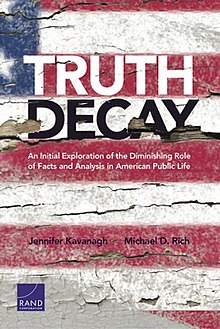Truth Decay (book)

Truth Decay is a 2018 book by and Michael D. Rich published by the RAND Corporation. It discusses the diminishing role of facts and analysis in American public life.[1]
The book covers Truth Decay's four trends:
- increasing disagreement about facts and analytical interpretations of facts and data
- a blurring of the line between opinion and fact
- the increasing relative volume, and resulting influence, of opinion and personal experience over fact
- declining trust in formerly respected sources of factual information.[2]
The authors differentiate Truth Decay from "fake news" and "post-fact/truth".
Many observers and analysts have responded to these trends in the political environment by arguing that global society has entered a "post-fact" world or by focusing on the spread of "fake news," broadly defined. We believe that the argument is inaccurate and the focus is misplaced. First, as noted earlier, facts and data have become more important in most other fields, with political and civil discourse being striking exceptions. Thus, it is hard to argue that the world is truly "post-fact." Second, a careful look at the trends affecting the U.S. political sphere suggests that such phenomena as "fake news" are only symptoms of a much more complex system of challenges, one with roots in the ways that human beings process information, the prevailing political and economic conditions, and the nature of the changed media environment. "Fake news" itself is not the driver of these deeper questions and issues, and simply stopping "fake news" is unlikely to address the apparent shift away from and loss of trust in data, analysis, and objective facts in the political sphere. As a result, a narrow focus on "fake news" distracts from a rigorous and holistic assessment of the more-extensive phenomenon—an assessment that might lead to remedies and solutions.
The book has spawned studies and panel discussions worldwide.[3]
RAND communications analyst Sonni Efron first suggested the term "truth decay" in this context.[4]
References[]
- ^ Kavanagh, Jennifer; Rich, Michael D.; Terry, Tara L.; Hardison, Chaitra M.; Schulker, David; Hou, Alexander C.; Payne, Leslie Adrienne (January 2018). Truth Decay. RAND Corporation. doi:10.7249/rr2314. ISBN 978-0-8330-9874-0.
- ^ The era of "truth decay": 12 things we still don't know about our weird time, , Nieman Lab, 2018-01-26
- ^ Truth Decay: Exploring the diminishing role of facts and analysis, United States Studies Centre, University of Sydney, 2018-08-22
- ^ Kavanagh, Jennifer; Rich, Michael D. (16 January 2018). "Truth Decay: An Initial Exploration of the Diminishing Role of Facts and Analysis in American Public Life". Cite journal requires
|journal=(help)
External links[]
- 2018 non-fiction books
- Sociology book stubs